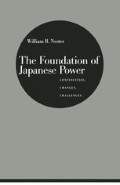Abstract
Japan’s policy-making regime has developed from the bureaucratic-led corporation of the 1950s to the present neo-corporatism. Although elements of the bureaucracy, LDP, and corporate world continue to dominate every policy area, the number of actors shaping many policies has not only multiplied both between and within the legs of the ruling triad, but traditional outsiders like the opposition parties and labor are increasingly allowed to participate. This is a natural evolution: as Japan’s economy grew more complex and differentiated, the arenas in which conflicts over policy take place and the number of actors in them had correspondingly to expand.
Access this chapter
Tax calculation will be finalised at checkout
Purchases are for personal use only
Preview
Unable to display preview. Download preview PDF.
Author information
Authors and Affiliations
Copyright information
© 1990 William R. Nester
About this chapter
Cite this chapter
Nester, W.R. (1990). Political Auxiliaries. In: The Foundation of Japanese Power. Palgrave Macmillan, London. https://doi.org/10.1007/978-1-349-20680-3_10
Download citation
DOI: https://doi.org/10.1007/978-1-349-20680-3_10
Publisher Name: Palgrave Macmillan, London
Print ISBN: 978-0-333-49378-6
Online ISBN: 978-1-349-20680-3
eBook Packages: Palgrave Economics & Finance CollectionEconomics and Finance (R0)

